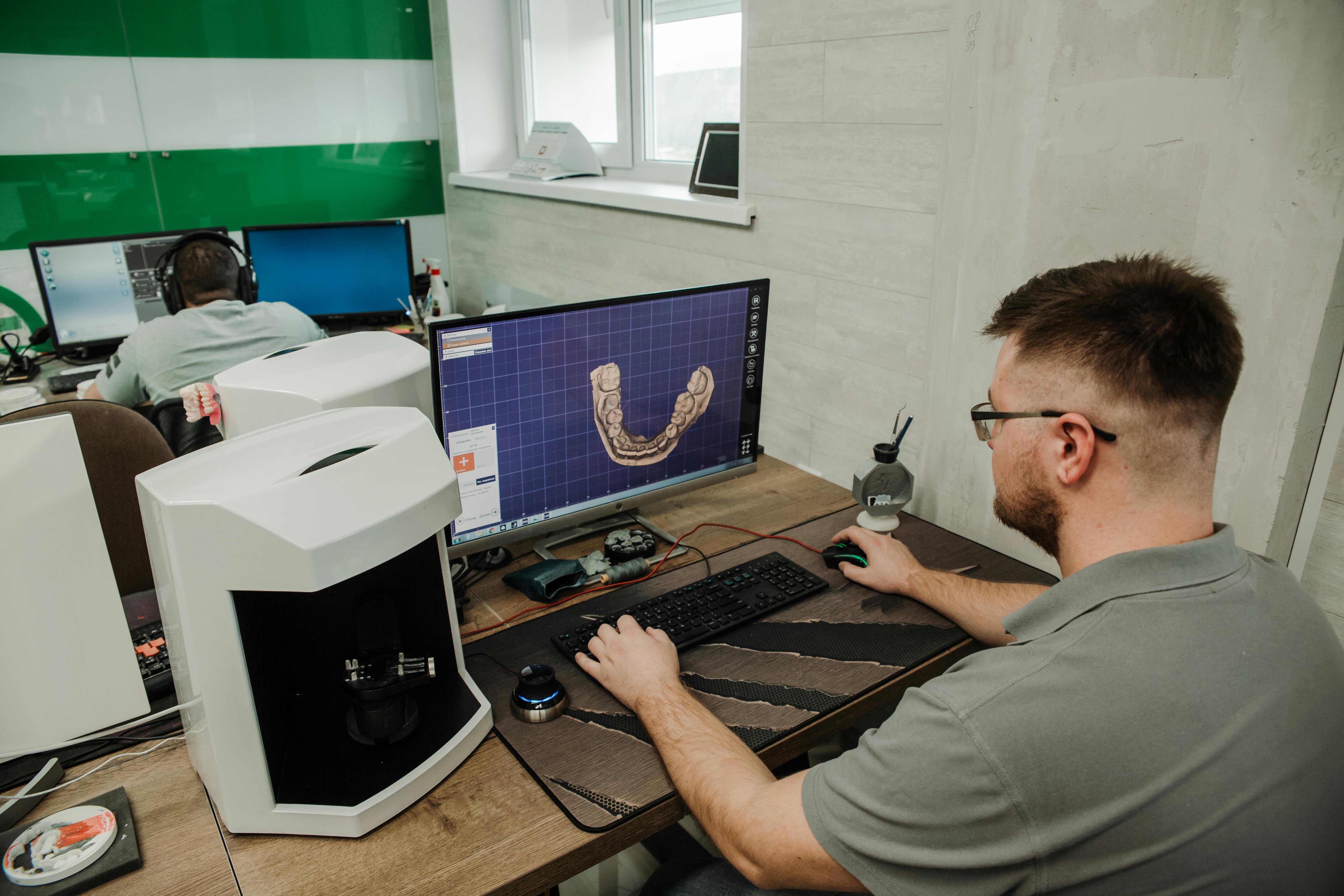Dental implants are a great way to replace missing teeth and restore your smile. But do they really feel like real teeth? The answer is yes! Dental implants are designed to look and feel like natural teeth, and with proper care, they can last for many years. In this article, we’ll discuss how dental implants feel like real teeth, the benefits of getting them, and how you can care for them.Dental implants are artificial tooth roots that are placed into the jawbone to hold a replacement tooth or bridge. The implant is made of titanium and is surgically placed in the jawbone where it fuses with the bone over time. After the implant is placed, a crown or other replacement tooth is attached to the implant. Dental implants provide a strong foundation for fixed (permanent) or removable replacement teeth that are made to match your natural teeth.
Types of Dental Implants
Dental implants are artificial tooth roots that are placed into the jaw to hold a permanent replacement tooth or bridge. There are several types of dental implants available, each with its own advantages and disadvantages. The most common types of dental implants include endosteal, subperiosteal, and mini implants.
Endosteal implants are the most commonly used type of dental implant and involve a surgically implanted metal cylinder, screw, or blade being placed directly into the jawbone. Once the implant has healed the artificial tooth is then attached. Endosteal implants offer long-term stability and are suitable for patients with strong jawbones who need multiple teeth replaced.
Subperiosteal implants involve placing metal frameworks on top of the jawbone but below the gum line, allowing for a more comfortable fit than endosteal implants. Subperiosteal implants are best suited for patients who don’t have enough healthy jawbone to support an endosteal implant or who cannot undergo extensive surgery.
Mini dental implants are small titanium screws that provide an effective alternative to traditional endosteal and subperiosteal implants for those with limited space in their mouths. Mini dental implants typically require less healing time and can be completed in a single visit to the dentist’s office. They can also be used to stabilize dentures or partial dentures for greater comfort and stability when eating and speaking.
No matter what type of dental implant is chosen, it is important to consult with a qualified dentist before making any decisions about treatment options. Your dentist will be able to provide more information about which type of implant is best for your individual needs and help you make an informed decision about your oral health care needs.
Understanding the Procedure for Getting Dental Implants
Dental implants are a common option for replacing missing teeth, and the process of getting dental implants can be broken down into a few simple steps. First, patients must visit their dentist or periodontist to determine if they are good candidates for the procedure. If so, they will undergo an initial consultation to discuss the type of implant, the location of placement, and what type of anesthesia may be used during the surgery. After this consultation and any necessary imaging tests have been completed, a surgical plan is formulated and treatment can begin. During the actual procedure, a small incision is made in the gums to expose the bone beneath, and then a titanium screw is inserted into it. This screw acts as an artificial root in which a replacement tooth can be attached. The implant is then covered with gum tissue to protect it from infection before being left to heal for several months. Following that healing period, additional appointments will be scheduled to monitor progress and attach any necessary prosthetic teeth. The entire process from start to finish usually takes between three and six months depending on individual circumstances.
Do Dental Implants Feel Like Real Teeth?
Dental implants are a reliable and long-lasting way to replace missing teeth. But one of the most important questions for patients considering dental implants is: “Do they feel like real teeth?”
The answer is a resounding “yes”! In fact, dental implants look and feel very much like real teeth. When crafted and placed correctly, dental implants can blend in perfectly with your existing teeth. And because they’re made of titanium, they’re incredibly strong and durable.
In addition to looking and feeling like real teeth, dental implants also function just like your natural teeth. You can eat, drink, brush and floss them just like you do with your natural teeth. You don’t have to worry about them slipping out of place or coming loose during meals or when talking.
Dental implants also provide a stable foundation for other restorations such as dentures or bridges. When properly secured to the implant posts, these restorations provide extra stability so that you can bite, chew and speak with confidence.
If you’re considering getting dental implants, rest assured that they will look and feel just like your natural teeth. They will also last for many years if you take good care of them by brushing twice a day, flossing daily and visiting your dentist regularly for checkups and cleanings.
Advantages of Having Dental Implants
Dental implants are a popular choice for replacing missing teeth. They provide a secure and permanent solution that looks and feels just like your natural teeth. Dental implants also offer a range of other benefits, including improved appearance, comfort, and oral health.
Appearance is important to many people when it comes to their teeth, and dental implants can provide an attractive smile. An implant-supported tooth looks and feels just like your natural teeth and blends in with the rest of your smile. The implant is made from titanium, which won’t show when you smile or talk. You can also choose to have a dental crown placed on the implant for even more natural-looking results.
Dental implants are also more comfortable than other tooth replacement options such as dentures. Implants are securely anchored in the jawbone, so they don’t move around when you eat or talk like dentures can. This makes them much more comfortable and stable.
In addition to providing an improved appearance and comfort, dental implants also help preserve oral health by preventing damage to the surrounding healthy teeth. When you have a missing tooth, the gap in your smile can cause the remaining teeth to shift out of place, which can lead to further damage or decay down the line. With an implant-supported tooth in place, this won’t happen since it will keep all of your other teeth in their proper positions.
Overall, dental implants are an excellent choice for replacing missing teeth due to their secure fit, improved appearance, comfort, and oral health benefits.

Are There Any Disadvantages to Having Dental Implants?
Dental implants can be a great option for those looking to replace missing teeth, but there are some potential drawbacks that should be considered. First, dental implants require surgery and anesthesia, which can carry some risks. Additionally, the implant procedure may be too complex for some people with certain medical conditions. Moreover, the cost of dental implants can be quite high and may not be covered by insurance. Lastly, although dental implants are typically very durable and long-lasting, they still require regular maintenance and proper care to ensure they remain in good condition.
How Much Do Dental Implants Cost?
Dental implants are a great way to replace missing teeth and restore your smile. They’re designed to look and feel just like natural teeth, and they’re usually considered the most permanent solution for tooth replacement. But with that permanence comes a certain cost. How much do dental implants cost?
The cost of dental implants can vary depending on the type of implant you need, the number of implants you require, and other factors. Generally speaking, the cost of a single implant can range from $1,000 to $3,000. However, if multiple implants are needed or additional procedures such as bone grafts are required, the overall cost could be much higher.
It’s important to understand that the upfront cost of dental implants is not the only expense to consider. Aftercare costs such as regular check-ups and maintenance appointments must also be taken into account when budgeting for your treatment. In addition, certain insurance plans may cover some of the expenses associated with dental implants so it is worth checking with your provider before you embark on treatment.
Ultimately, dental implants can be an expensive investment but they are generally well worth it in terms of convenience and longevity. By opting for quality care from an experienced dentist who uses high-grade materials and techniques, you can ensure that your new smile will last for years to come.
Does Insurance Cover the Cost of Dental Implants?
Dental implants are an increasingly popular option for replacing missing teeth, as they provide a permanent and natural-looking solution. However, they can be expensive, so you may be wondering if your insurance will cover the cost. Unfortunately, most insurance policies do not cover the full cost of dental implants, although some may offer partial coverage.
In general, dental insurance plans typically cover preventive care such as check-ups and cleanings. They may also cover procedures such as fillings and crowns. However, they usually do not cover cosmetic procedures like dental implants. Some plans may offer partial coverage for certain types of dental implants, such as those used to replace a single tooth or multiple teeth.
If you are considering getting dental implants, it is important to check with your insurance provider to see what type of coverage is available. Even if your policy does not provide full coverage for dental implants, there may be other options available that can help reduce the cost. For example, some providers offer discounts for patients who pay in full at the time of treatment or those who opt for a payment plan instead of financing their procedure.
Additionally, you can check with your local dental society to see if there are any special discounts or reduced rates available for dental implant procedures in your area. Many dentists also offer financing options through third-party lenders that can make it easier to afford this type of treatment.
Overall, while most insurance policies do not provide full coverage for dental implants, there are still several ways to reduce the cost and make them more affordable. Be sure to check with your provider and explore all available options before making a decision about treatment.

Conclusion
Dental implants provide an excellent solution to replace missing teeth and restore a natural-looking smile. The implant posts, abutments, and crowns all work together to provide a secure fit and restorative results that look and feel just like natural teeth. Dental implants are also the longest-lasting tooth replacement option available. With proper care, they can last a lifetime.
Patients who receive dental implants report that they feel much more confident in their appearance, as well as their ability to eat and speak naturally. With improved aesthetics and function, dental implants may be the right choice for those who want to restore their beautiful smile with a permanent solution.
At the end of the day, dental implants are designed to look, feel, and function like real teeth. With proper care and maintenance, they can last for many years while providing a secure fit and superior results for patients of all ages.
